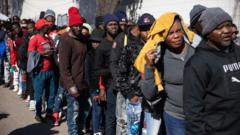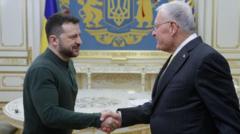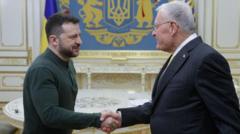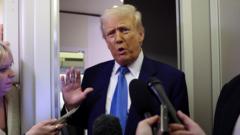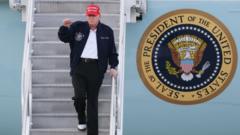Javier Milei's administration in Argentina has announced plans to withdraw from the World Health Organization, reflecting a strategy similar to that of Donald Trump during his presidency, thus jeopardizing Argentina's relationships with traditional allies.
Aligning with Trump: Argentina's Exit from the WHO

Aligning with Trump: Argentina's Exit from the WHO
President Milei mirrors Trump's international policies amid rising tensions.
In a bold political move, Argentine President Javier Milei declared on Wednesday the country’s withdrawal from the World Health Organization (WHO), echoing the actions of former U.S. President Donald Trump. This decision comes as part of Milei's broader strategy to align Argentina with Trump’s contentious stance towards international organizations, even at the cost of severing ties with its previous partners.
Milei criticized the WHO for its role in supporting "draconian lockdowns" during the COVID-19 pandemic, describing these measures as “one of the most egregious crimes against humanity in history.” He emphasized that the decision to exit from what he termed a "nefarious organization" is to distance Argentina from what he perceives as a significant infringement on civil liberties.
This announcement parallels Trump's decision to pull the United States from the WHO on his first day in office, where he also condemned the organization’s pandemic response and the financial obligations it imposed on member states. Despite having previously criticized WHO’s pandemic policies—he even authored a book denouncing them in 2020—Milei's decision to formally withdraw comes after Trump’s similar move, reinforcing a growing trend among certain right-wing leaders globally.
If both Argentina and the United States complete their withdrawal, they will join Liechtenstein as the unique cases of U.N. member nations not participating in WHO activities. This shift appears to be part of Milei’s broader strategy to align politically and ideologically with Trump’s populist and often isolationist tendencies in international relations.
Critics fear that this move may isolate Argentina on the world stage and undermine its global health partnerships. However, supporters argue it is a necessary step for Argentine sovereignty and a rejection of external pressures that are seen as contrary to national interests. As Argentina steps away from the WHO and further into a contentious political landscape, the long-term implications of this decision remain to be seen.
Milei criticized the WHO for its role in supporting "draconian lockdowns" during the COVID-19 pandemic, describing these measures as “one of the most egregious crimes against humanity in history.” He emphasized that the decision to exit from what he termed a "nefarious organization" is to distance Argentina from what he perceives as a significant infringement on civil liberties.
This announcement parallels Trump's decision to pull the United States from the WHO on his first day in office, where he also condemned the organization’s pandemic response and the financial obligations it imposed on member states. Despite having previously criticized WHO’s pandemic policies—he even authored a book denouncing them in 2020—Milei's decision to formally withdraw comes after Trump’s similar move, reinforcing a growing trend among certain right-wing leaders globally.
If both Argentina and the United States complete their withdrawal, they will join Liechtenstein as the unique cases of U.N. member nations not participating in WHO activities. This shift appears to be part of Milei’s broader strategy to align politically and ideologically with Trump’s populist and often isolationist tendencies in international relations.
Critics fear that this move may isolate Argentina on the world stage and undermine its global health partnerships. However, supporters argue it is a necessary step for Argentine sovereignty and a rejection of external pressures that are seen as contrary to national interests. As Argentina steps away from the WHO and further into a contentious political landscape, the long-term implications of this decision remain to be seen.


